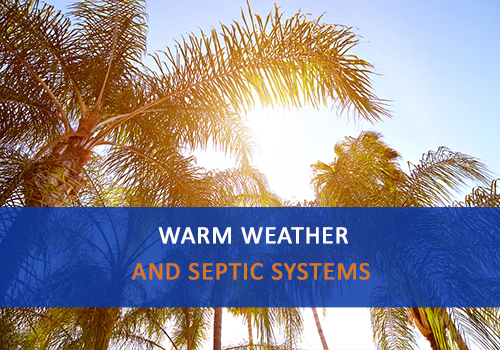Many folks are still surprised to hear that when it comes to wastewater treatment and septic systems, the process relies heavily on natural processes and bacteria.
And temperature can affect how well those bacteria can break down waste in your system. So, some weather and septic systems work better. But, is it better to be warm or cold?

Bacteria in Your Septic Tank & How They Operate
Inside your septic tank are anaerobic bacteria, and they are thriving in a healthy septic tank.
Why? Because they have a seemingly unlimited food source — your waste. When waste enters your septic tank, the bacteria begin to feast and break down the waste through digestion. In goes solids and out comes liquids and gases.
In fact, they are so good at their job, they are in charge of up to 50% of waste decomposition in your system — and you can’t even see them.
But, all this relies on a healthy bacteria population, and they can be a delicate. Things like chemicals, too much water, too much sludge, and sudden changes in the environment can throw them off. Oh! And less than ideal temperatures too.
Weather and Septic Systems
When it comes to temperature, warm weather and septic systems usually mix better. Great news for Florida!
But, why is that?
For bacteria, their sweet spot when it comes to temperature is between 70 – 95 degrees Fahrenheit. So, warmer weather is better. And with the temperature in the septic tank rising as they break down waste (eating takes a lot of work when you’re that small), they can operate in even warmer temperatures. But, they need that base range to be at their most productive.
So, warm weather and septic systems, they get along great! But, what happens when the temperatures start to dip?
Cold Weather and Septic Systems
Colder temperatures affect all aspects of your septic and waste treatment, not just the septic tank. But, let’s start with the bacteria.
As the temperature decreases, the time it takes bacteria to break down waste increases. They are slower to eat, slower to digest, and slower to break down the waste in your tank. So if you find yourself on one of those rare Florida cold spells, be extra kind to the bacteria in your tank. They are working hard and doing their best to keep up in the chilly temps.
Colder temperatures also change the soil and drainage of your drain field. As the is cools off, your soil becomes harder and more compact, making it more difficult for the surrounding area to drain and filter the water from your drain field. Yet another reason warm weather and septic systems work better together.
The weather has a significant effect on your septic system. Luckily in Florida, we rarely worry about cold temperatures. But, the trade-off is other weather patterns that can hurt our septic systems.
Storms and Septic Systems
While the Sunshine State stays warm, we don’t always stay dry.
Rainstorms and heavy winds (oh hello hurricane season) can harm your septic system. Heavy rainfall, overloaded drains, downed trees, heavy debris, and more can affect your septic system’s ability to do its job.
Keeping Your Septic Healthy
When it comes to temperatures, warm weather and septic systems work best together — great news for Florida septic systems and their owners.
But, your system needs more than ideal temperatures. It needs owners that follow the do-not-flush rules, pay attention to septic guidelines, and perform regular maintenance. At Advanced Septic Services, we are here to help with all aspects of septic systems. Give us a call today at (352) 242-6100 with any of your septic questions.

